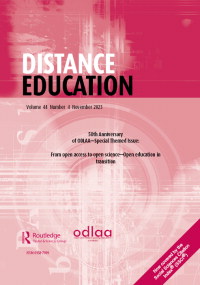了解大学生在线协作解决问题的认知参与:多模式数据分析
IF 3.7
1区 教育学
Q1 EDUCATION & EDUCATIONAL RESEARCH
引用次数: 0
摘要
摘要实验室经验对于培养大学生的协作解决问题(CPS)能力至关重要,但学生在在线实验室课程中是否保持认知参与CPS任务仍然未知。本研究应用多模态数据分析来检验大学生(N=36)在在线实验体验中对CPS的认知参与。三人一组通过共享工作表和视频会议上基于计算机的模拟,在CPS任务上进行合作。便携式脑电图仪用于确定学生在CPS活动中的认知参与水平。多模态数据分析(如脑电图、调查和假象)结果显示,CPS不同阶段的学生认知参与存在显著差异。完成任务和未完成任务的组之间,学生的认知投入存在显著差异。此外,内在动机预测了完成组学生的认知参与,而自我效能感是未完成任务组认知参与的主要预测因素。本文章由计算机程序翻译,如有差异,请以英文原文为准。
Understanding college students’ cognitive engagement in online collaborative problem-solving: A multimodal data analysis
Abstract Laboratory experience is critical to foster college students’ collaborative problem-solving (CPS) abilities, but whether students stay cognitively engaged in CPS tasks during online laboratory sessions remains unknown. This study applied multimodal data analysis to examine college students’ (N = 36) cognitive engagement in CPS during their online experimentation experience. Groups of three collaborated on CPS tasks via shared worksheets and computer-based simulations on videoconferences. Portable electroencephalogram instruments were used to determine students’ levels of cognitive engagement in CPS activities. The multimodal data analysis (e.g., electroencephalogram, surveys, and artifacts) results showed a significant difference in students’ cognitive engagement between different phases of CPS. The students’ cognitive engagement significantly differed between groups who did and did not complete the task. Additionally, intrinsic motivation predicted students’ cognitive engagement in the completion groups while self-efficacy was the primary predictor of cognitive engagement for the groups who did not complete the task.
求助全文
通过发布文献求助,成功后即可免费获取论文全文。
去求助
来源期刊

Distance Education
EDUCATION & EDUCATIONAL RESEARCH-
CiteScore
10.70
自引率
6.80%
发文量
29
期刊介绍:
Distance Education, a peer-reviewed journal affiliated with the Open and Distance Learning Association of Australia, Inc., is dedicated to publishing research and scholarly content in the realm of open, distance, and flexible education. Focusing on the freedom of learners from constraints in time, pace, and place of study, the journal has been a pioneering source in these educational domains. It continues to contribute original and scholarly work, playing a crucial role in advancing knowledge and practice in open and distance learning.
 求助内容:
求助内容: 应助结果提醒方式:
应助结果提醒方式:


